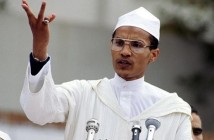 IN MOROCCO their language has been made official. In Algeria they lead protests against President Abdelaziz Bouteflika’s regime. In Tunisia they are rediscovering a long-suppressed identity. In Libya they man the rebels’ western front in the mountains south of the capital still held by Muammar Qaddafi. Even in Egypt’s oasis of Siwa, near Libya’s border, Berbers are finding that the revolution has given them a chance to revive their cultural rights.
IN MOROCCO their language has been made official. In Algeria they lead protests against President Abdelaziz Bouteflika’s regime. In Tunisia they are rediscovering a long-suppressed identity. In Libya they man the rebels’ western front in the mountains south of the capital still held by Muammar Qaddafi. Even in Egypt’s oasis of Siwa, near Libya’s border, Berbers are finding that the revolution has given them a chance to revive their cultural rights.
“There is a Berber renaissance taking place across north Africa,” enthuses Mounir Kejji, a Moroccan Berber campaigner. In his country a new constitution, endorsed in a referendum on July 1st, officially recognises the Berber language for the first time, though parliament will decide what this means in practice; Arab nationalists and many Islamists have long demanded that Arabic be the sole language of administration and state education.
The authoritarian Arab nationalist regimes that dominated the region used to accuse the Berbers of threatening national cohesion. Now, shaken and in some cases overthrown, they have seen Berber activism take on a new lease of life. Even where they are a minority of only a few thousand, as in Egypt and Tunisia, Berbers have been able for the first time to form community associations.
Libya’s rebellion is fiercest in the Nafusa Mountains, a Berber heartland long neglected by the government. Colonel Qaddafi has refused to acknowledge Berber culture for most of his reign, describing it as “colonialism’s poison” intended to divide the country. Only in 2006, apparently after his son Seif al-Islam intervened, did he lift a ban on the use of Berber names.
Berbers make up about 5% of Libya’s 6m-7m people, though some activists put the figure higher. In recent weeks they have set up a radio station. The rebel-controlled Libya TV, based in Qatar, now broadcasts in Tamazight, the Berber tongue, for two hours a day. In June, says Mr Kejji, a delegation of Libyan Berbers affiliated to the rebels’ Transitional National Council put a linguistic query to their Moroccan counterparts: how should they write “army”and “national security” in Tamazight, so that Libyan uniforms could have a badge in their own language alongside Arabic?
A written script for the various Berber dialects was created only in the 20th century. Algeria’s Kabyles, a Berber people said to number 4m, have usually preferred the Latin alphabet, whereas a Tuareg alphabet, called Tifinagh, is now officially used in Morocco and has been adopted by Libyan Berbers who were banned from using it under the colonel. (The Tuareg are nomadic Berber pastoralists living mainly in southern Algeria, eastern Mali and western Niger.)
The Berber revival has rekindled enthusiasm for pan-Berber solidarity. “There’s an awareness among Berbers across north Africa of that element of their identity which they share,” says Hugh Roberts, an expert on the Maghreb. But each country in the region, he says, has its own particularities. The dream of creating a community of 20m-plus people (estimates of the total vary widely), stretching from Egypt’s western desert to the Atlantic, would be stymied by the multiplicity of Berber dialects and by the variety of political circumstances. “A single Berber identity exists only virtually—on the internet and among diaspora intellectuals,” says Mr Roberts.
http://www.economist.com/node/21525925






